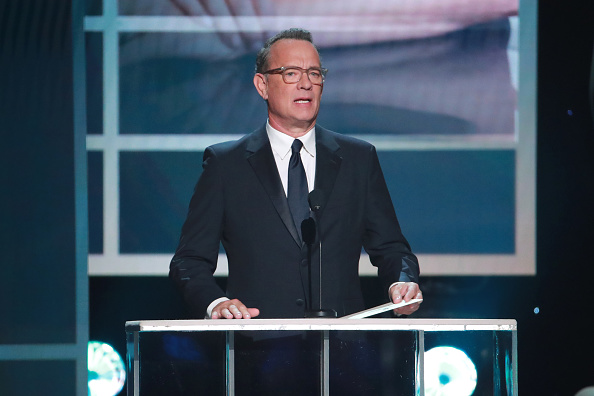Tom Hanks acknowledges his own guilt in powerful essay about teaching the history of racism


A free daily email with the biggest news stories of the day – and the best features from TheWeek.com
You are now subscribed
Your newsletter sign-up was successful
Tom Hanks expressed guilt over his role in an industry that "helps shape what is history and what is forgotten" in a powerful op-ed for The New York Times about the strikingly overlooked 1921 Tulsa race massacre. In the essay, published Friday, Hanks described himself as "a lay historian," but confessed to knowing nothing about the murder of as many as 300 Black residents at the hands of a white supremacist mob until last year.
"History was mostly written by white people about white people like me, while the history of Black people — including the horrors of Tulsa — was too often left out," he writes. "Until relatively recently, the entertainment industry, which helps shape what is history and what is forgotten, did the same. That includes projects of mine."
Hanks makes the case that the history of the massacre should be taught in classrooms "even as early as the fifth grade," and that educators "should also stop the battle to whitewash curriculums to avoid discomfort for students. America's history is messy but knowing that makes us a wiser and stronger people."
The Week
Escape your echo chamber. Get the facts behind the news, plus analysis from multiple perspectives.

Sign up for The Week's Free Newsletters
From our morning news briefing to a weekly Good News Newsletter, get the best of The Week delivered directly to your inbox.
From our morning news briefing to a weekly Good News Newsletter, get the best of The Week delivered directly to your inbox.
Hanks also used his essay to urge the entertainment industry to consider its role in shaping the narrative as well:
Today, I think historically based fiction entertainment must portray the burden of racism in our nation for the sake of the art form's claims to verisimilitude and authenticity. Until recently, the Tulsa Race Massacre was not seen in movies and TV shows. Thanks to several projects currently streaming, like Watchmen and Lovecraft Country, this is no longer the case. Like other historical documents that map our cultural DNA, they will reflect who we really are and help determine what is our full history, what we must remember. [The New York Times]
Read the full essay at The New York Times here.
A free daily email with the biggest news stories of the day – and the best features from TheWeek.com
Jeva Lange was the executive editor at TheWeek.com. She formerly served as The Week's deputy editor and culture critic. She is also a contributor to Screen Slate, and her writing has appeared in The New York Daily News, The Awl, Vice, and Gothamist, among other publications. Jeva lives in New York City. Follow her on Twitter.
-
 What is the endgame in the DHS shutdown?
What is the endgame in the DHS shutdown?Today’s Big Question Democrats want to rein in ICE’s immigration crackdown
-
 ‘Poor time management isn’t just an inconvenience’
‘Poor time management isn’t just an inconvenience’Instant Opinion Opinion, comment and editorials of the day
-
 Bad Bunny’s Super Bowl: A win for unity
Bad Bunny’s Super Bowl: A win for unityFeature The global superstar's halftime show was a celebration for everyone to enjoy
-
 ‘One Battle After Another’ wins Critics Choice honors
‘One Battle After Another’ wins Critics Choice honorsSpeed Read Paul Thomas Anderson’s latest film, which stars Leonardo DiCaprio, won best picture at the 31st Critics Choice Awards
-
 Son arrested over killing of Rob and Michele Reiner
Son arrested over killing of Rob and Michele ReinerSpeed Read Nick, the 32-year-old son of Hollywood director Rob Reiner, has been booked for the murder of his parents
-
 Rob Reiner, wife dead in ‘apparent homicide’
Rob Reiner, wife dead in ‘apparent homicide’speed read The Reiners, found in their Los Angeles home, ‘had injuries consistent with being stabbed’
-
 Hungary’s Krasznahorkai wins Nobel for literature
Hungary’s Krasznahorkai wins Nobel for literatureSpeed Read László Krasznahorkai is the author of acclaimed novels like ‘The Melancholy of Resistance’ and ‘Satantango’
-
 Primatologist Jane Goodall dies at 91
Primatologist Jane Goodall dies at 91Speed Read She rose to fame following her groundbreaking field research with chimpanzees
-
 Florida erases rainbow crosswalk at Pulse nightclub
Florida erases rainbow crosswalk at Pulse nightclubSpeed Read The colorful crosswalk was outside the former LGBTQ nightclub where 49 people were killed in a 2016 shooting
-
 Trump says Smithsonian too focused on slavery's ills
Trump says Smithsonian too focused on slavery's illsSpeed Read The president would prefer the museum to highlight 'success,' 'brightness' and 'the future'
-
 Trump to host Kennedy Honors for Kiss, Stallone
Trump to host Kennedy Honors for Kiss, StalloneSpeed Read Actor Sylvester Stallone and the glam-rock band Kiss were among those named as this year's inductees
